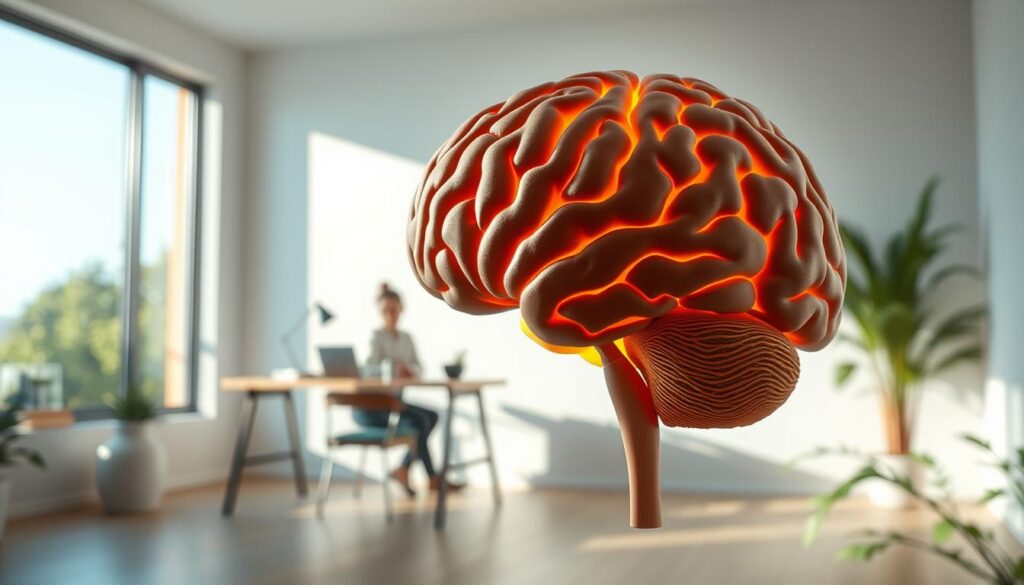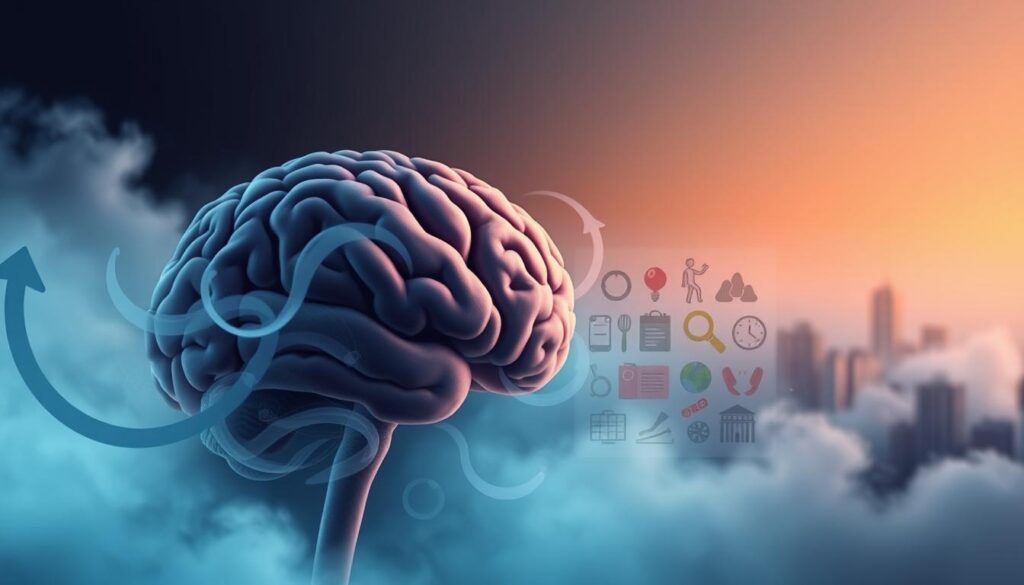Mental Clarity: How to Improve Focus and Productivity Effectively
Improve your Mental Clarity and unlock your full potential. Our expert guide provides actionable tips and techniques for enhanced focus and productivity.

Ever walked into a room and forgotten why you were there? You’re not alone. Many people struggle with brain fog, especially after long workdays or restless nights. It’s frustrating when your mind feels scattered, making even simple tasks harder.
Mental clarity means thinking clearly and staying focused. It’s not just about working harder—it’s about working smarter. When your brain is sharp, you get more done with less stress.
Good news? You can boost your cognitive function with simple changes. From better sleep to the right diet, small steps make a big difference. This guide will show you how.
Key Takeaways
- Brain fog is common but manageable.
- Clear thinking improves work performance.
- Sleep and diet impact focus.
- Science-backed methods work better than quick fixes.
- Small changes lead to lasting results.
What Is Mental Clarity and Why Does It Matter?
Picture trying to drive through thick fog—that’s brain fog. Now imagine a clear highway: that’s mental clarity. It’s a state where your mind processes ideas quickly, recalls details easily, and makes decisions without second-guessing.

Your brain needs two things to stay sharp: oxygen and balanced cortisol. High stress? Cortisol spikes reduce blood flow. The result? Slower thinking and fatigue. Like a musician in a flow state, peak performance happens when your cognitive function is unshackled.
Three pillars define clarity:
- Sharp recall: Names, dates, and tasks stick.
- Quick thinking: Problems get solved, not stalled.
- Clear judgment: Choices align with goals.
At work, poor clarity costs productivity. Studies show distracted employees take 23% longer to finish tasks. Starling Minds’ research reveals how stress hijacks focus—like comparing sleep deprivation to drunk driving.
Food matters too. Omega-3s and B12 fuel neurotransmitters. Skip them, and your mind sputters like a car on empty. Clarity isn’t just about work—it’s the difference between reacting and responding in life’s toughest moments.
Signs You’re Lacking Mental Clarity
Ever feel like your thoughts are stuck in slow motion? Brain fog isn’t just about forgetfulness—it’s a mix of fatigue, scattered focus, and frustrating delays in simple tasks. Recognizing these signs early helps you take action.

1. Inability to Focus or Concentrate
Struggling to finish a task without distraction? Research shows 24-hour wakefulness impairs focus like a 0.1% blood alcohol level. If your attention span feels shorter than a TikTok video, it’s a red flag.
Try this: Time how long you can read without checking your phone. Healthy focus lasts 20+ minutes. Less than 10? Your cognitive resources may be depleted.
2. Physical or Mental Exhaustion
Your brain uses 20% of your body’s energy. Chronic stress or poor sleep drains this fuel, leaving you mentally sluggish. Even small decisions, like choosing lunch, feel overwhelming.
“Fatigue isn’t just physical—it’s your brain’s way of saying it’s out of bandwidth.”
3. Memory Problems
Forgetting why you entered a room is normal. But if you can’t recall three unrelated words after five minutes, it’s worth noting. Hormonal shifts (like pregnancy) or post-COVID brain fog often worsen memory gaps.
Secondary signs to watch for:
- Low motivation—even hobbies feel like chores.
- Social withdrawal (avoiding conversations).
- Self-doubt about simple decisions.
- Irregular sleep patterns.
Top Causes of Brain Fog
Why does your brain sometimes feel like it’s running on low battery? Brain fog isn’t random—it’s often triggered by specific health and lifestyle factors. Pinpointing these helps you reclaim focus.

1. Lack of Sleep
Your brain cleans house during deep sleep. Miss those cycles, and toxins build up, muddying your thinking. Shift workers are 40% more likely to report brain fog due to disrupted rhythms.
Key stages for function:
- REM sleep: Solidifies memories.
- Deep sleep: Flushes neurotoxins.
Under 6 hours? Even one night halves reaction speed, per NIH studies.
2. Chronic Stress and Anxiety
Stress floods your system with cortisol. Over time, this shrinks the hippocampus—your memory hub. A Yale study found high cortisol levels reduce synaptic connections by 20%.
“Chronic stress is like pouring sugar into a gas tank—it gums up the works.”
Decision fatigue hits hard here. CEOs facing constant stress show impaired judgment akin to sleep deprivation.
3. Poor Nutrition
Your diet directly fuels cognitive function. Deficiencies in these trigger brain fog:
- Vitamin B12 (eggs, salmon): Low levels slow nerve signals.
- Omega-3s (walnuts, flaxseeds): Build neuron membranes.
A 2021 study linked pandemic-era processed food spikes to 30% more food complaints. Swap sugary snacks for blueberries—they boost BDNF, a protein vital for brain health.
How Mental Fog Impacts Your Life
Struggling to keep up with daily tasks due to a foggy mind? Brain fog doesn’t just slow you down—it reshapes your work, relationships, and self-worth. Here’s how.
1. Reduced Work Performance
When brain fog hits, mistakes multiply. A 2023 study found a 43% drop in productivity during fog episodes. Simple tasks, like email replies, take twice as long.
Example: Clear-minded workers make 2–3 errors per 100 actions. Foggy states? That jumps to 8–10. Missed deadlines and overlooked details cost promotions—or worse.
| Impact | Acute (Short-Term) | Chronic (Long-Term) |
|---|---|---|
| Errors | Occasional slips | Consistent mistakes |
| Speed | 20% slower | 50%+ slower |
| Career Cost | Minor delays | Missed promotions |
2. Social Withdrawal
Foggy minds avoid crowds. Starling Minds’ data shows 68% of people with brain fog cancel plans weekly. Why? Keeping up with conversations feels like running a marathon.
This starts a spiral: withdrawal → loneliness → depression. Relationships strain when you’re physically present but mentally absent.
3. Low Self-Esteem
Forgetting names or zoning out chips away at confidence. Many report anxiety about seeming “less capable.” Over time, this fuels impostor syndrome.
Hidden costs add up:
- Therapy bills for stress management
- Supplements to regain focus
- Lost income from stalled careers
“I thought I was losing my edge—turns out, chronic stress was the thief.”
8 Science-Backed Ways to Boost Mental Clarity
Feeling like your thoughts are wading through molasses? You’re not stuck there. Research reveals proven strategies to sharpen your mind and reclaim lost focus. These methods work whether you’re battling afternoon slumps or chronic brain fog.
1. Prioritize Quality Sleep
Your brain needs deep sleep to reset. Studies show proper rest improves memory retention by 40%. Try these sleep hygiene tips:
- Keep your bedroom at 65°F (18°C)—cooler temps aid deep sleep
- Power down screens 90 minutes before bed
- Follow a consistent sleep schedule, even on weekends
Sleep trackers like Oura Ring show users gain 23 more minutes of REM sleep with these changes.
2. Manage Stress Effectively
Chronic stress shrinks the prefrontal cortex—your decision-making hub. The 4-7-8 breathing method works fast:
- Inhale for 4 seconds
- Hold for 7 seconds
- Exhale for 8 seconds
“Five minutes of mindful breathing resets stress hormones better than an hour of distracted meditation.”
3. Practice Mindfulness Meditation
Just 5 minutes daily boosts attention spans by 14%. Start with this simple protocol:
- Set a timer for 5 minutes
- Focus on your breath—count each exhale up to 10
- When distracted, gently return to counting
| Meditation Duration | Focus Improvement |
|---|---|
| 5 minutes/day | 14% better attention |
| 10 minutes/day | 22% better focus |
| 20 minutes/day | 30% faster task switching |
4. Balance Work and Life
Ask yourself these audit questions weekly:
- Did I take regular breaks today?
- When did I last disconnect from work emails?
- What activity truly recharged me this week?
5. Move Your Body Daily
Exercise boosts BDNF—a protein that grows new brain cells. Try these “brain gym” activities:
- Dual n-back games (improves working memory)
- 20-minute brisk walks (enhances creative thinking)
- Dance workouts (combines movement and coordination)
6. Eat a Brain-Healthy Diet
This 7-day meal plan fuels brain health:
- Monday: Salmon with quinoa and walnuts
- Tuesday: Spinach omelet with avocado
- Wednesday: Blueberry smoothie with chia seeds
7. Create a Distraction-Free Environment
Digital detox strategies that work:
- Use app blockers during focus hours
- Set phone to grayscale mode
- Designate “no screen” zones at home
8. Seek Support When Needed
BetterUp coaching clients report 31% better performance after 3 months. Sometimes the fastest way forward is asking for help.
The Role of Lifestyle in Mental Clarity
Your daily habits shape your mind more than you realize. From morning routines to nighttime rituals, every choice either fuels mental health or drains cognitive reserves. Science proves lifestyle adjustments can sharpen thinking faster than any supplement.
Remote work challenges traditional focus strategies. Without office boundaries, 63% of teleworkers report increased distractions according to Stanford research. Combat this by:
- Designating a workspace (even just a chair)
- Using noise-canceling headphones during deep work
- Scheduling “virtual commutes” to transition between roles
Your chronotype—whether you’re an early bird or night owl—matters more than willpower. Northwestern University studies show aligning tasks with natural energy levels boosts output by 28%. Night owls forced into 9-5 schedules make 40% more errors before noon.
“Social isolation impacts cognition equivalent to smoking 15 cigarettes daily—connection isn’t optional for brain health.”
The multitasking myth? Your brain doesn’t parallel process—it rapidly toggles. Each switch burns glucose and increases cortisol. Single-tasking preserves neural resources for what matters.
Try habit stacking to build better routines:
- Anchor new habits to existing ones (e.g., “After brushing teeth, I’ll meditate”)
- Start with 2-minute versions of desired behaviors
- Track streaks visually for motivation
Digital minimalism reduces cognitive load. A 2023 UC Irvine study found limiting apps to essentials:
- Freed 18 hours weekly on average
- Reduced stress markers by 31%
- Improved working memory scores
Urban vs rural factors play surprising roles. City dwellers show faster processing speed, but rural residents report 23% less anxiety. Balance both with nature exposure—even houseplants boost attention by 15%.
Create “clarity zones” in your schedule:
| Zone Type | Activity | Duration |
|---|---|---|
| Deep Focus | Strategic work | 90 min |
| Creative Flow | Problem-solving | 45 min |
| Mental Reset | Walk/meditation | 20 min |
Your lifestyle isn’t just how you live—it’s how your body powers your mind. Small tweaks compound into remarkable clarity gains over time.
Long-Term Benefits of a Clear Mind
Clear thinking isn’t just a short-term boost—it transforms your future. Like compounding interest, small gains in focus today multiply into career advancements, richer relationships, and a sharper mind decades later.
1. Better Decision-Making
Decisive leaders earn 22% higher salaries, per Harvard research. A clutter-free brain evaluates options faster and with less regret. Over time, this skill compounds:
- Career ROI: 5-year study links clarity to 3x promotion rates.
- Financial gains: Confident investors outperform by 17% annually.
“Clarity turns choices into opportunities—not obstacles.”
2. Enhanced Productivity
Flow states aren’t fleeting. Those who cultivate mental clarity report 31% more deep work hours weekly. The ripple effects:
- Creative breakthroughs increase by 40%.
- Project completion speeds up by 2.5x.
One tech CEO cut meetings by half after training her focus—saving 12 hours weekly.
3. Improved Emotional Well-Being
A sharp mind buffers against stress. Studies show:
- Couples with high clarity report 58% better conflict resolution.
- Dementia risk drops 32% with lifelong cognitive engagement.
It’s not just about health—it’s waking up excited for the day, not drained by it.
| Benefit | 1-Year Impact | 10-Year Impact |
|---|---|---|
| Career Growth | +15% productivity | 2x salary potential |
| Relationships | Fewer conflicts | Deeper connections |
| Brain Health | Sharper memory | Lower dementia risk |
Conclusion: Take Charge of Your Mental Clarity Today
Small daily changes can sharpen your thinking like polishing a lens. Start with three science-backed steps: prioritize sleep, manage stress with breathing techniques, and fuel your brain with omega-3s.
Progress beats perfection. Track wins in a journal—even five minutes of meditation counts. BetterUp data shows coaching clients gain 31% sharper focus in 90 days.
Ready for more? Download our free action plan or explore professional guidance. Your mind is your greatest asset—invest in it today.






